#major theory rn rn
Text
perfect world where chaos theory season 2 has the camp fam stumble across a dino reserve in africa run by dave and roxie. and firecracker and angel and rebel are there. and mae and pierce too. and like every dino from mantah corp 🙏
#you cant tell me rescuing bumpy wasnt a major heist#date night: we rescue my adoptive dino daughter together (she still likes you better. plss stop carrying snacks near her)#or that the same kids who beat dan + kash + investors wouldnt risk life and limb again to protect all those dinos#'why didnt anyone call to say u were coming haha' 'SOMEONE threw my phone in a lake'#going back to bumpy heist again. i need ben + yasammy tri-parenting shenanigans rn#jwct#chaos theory#jurassic world#nublar six#chaos theory theory#lmao??#jwct theory#well. probably a crack theory
38 notes
·
View notes
Text
Ngl season 2 is lowkey a reflection of the manga now. Alois is supposed to be like the Real Ciel I think💀 they also got some type of trauma over their little brother (who made a deal with a demon and also wanted everyone dead that hurt them)
If our Ciel stabs real Ciel tho….i can see real Ciel begging the undertaker to help him but the undertaker being more concerned with our Ciel (he is the one alive and still has his soul)
#I still hate season 2 tho#kuroshitsuji#black butler#ciel phantomhive#real ciel#alois trancy#I would accept an alois spinoff#as long as it doesn’t involve ciel#and a major reworking of his servants#I’m baked af rn#I’m not looking for people to come in and come at me#I like hearing theories but I prefer mostly in the comments unless it’s something in agreement#just cause I get uncomfy sometimes sorry:(((
22 notes
·
View notes
Text
so i fucked up my uni class schedule and accidentally registered for an in-person night class (i only registered for it bc it was labeled as an online one but ig the modality switched)
lore drop about me: i HAVE to be winding down by like 6pm unless i have been planning on doing stuff past 5pm for a while, and i HAVE to be in bed by like 10pm (11pm at the latest) bc i have a very strict audhd-fueled schedule
this shit is gonna suck aughhhhh
and for context: i can't drop and switch the class bc 1) it's a required class for me to graduate and 2) i'm very poor and haven't paid my student bill yet (and won't be able to for a while) so i have a hold on my account preventing me from even looking at possible other times for this class
#the class is theory of cultural anthropology btw#i failed it the first time bc i do NOT do great in in-person classes with strict schedules#i also don't have ample transportation to get to campus rn AND i'm audhd as fuck#student life of oli#i hate i hate i hate#oli being silly#college#uni#university#classes#student#studying#student life#anthropology major
3 notes
·
View notes
Text
damn faroe's song is. so fucking good
#again i already knew this#but i just did fucking Music Theory on it and Wowie That Sure is Music#bluebird.txt#malevolent#eh it's always going major minor major minor major minor#it's pretty cool how the ends of the 'main chorus-y' part (i don't remmeber how to call it rn)#i guess the longer phrase?? idk cuz it's eight bar phrases but like. when it gets to the climax of the bigger line. whatever#it's cool how it so badly wants to resolve to B major and yet it keeps getting pulled back to B minor#like ah yes. the grief.#n e ways
9 notes
·
View notes
Note
What do you think about renheng as a ship now?
...am i supposed to think smth different now...? did i miss smth? i didnt learn much new things from this update that i didnt know already apart from deeper understanding of dan hengs past so my thoughts are unchanged.
#i already forgot half of the newest chapter other than important major parts so i cant remember if there was#anything big that would change my thoughts#altho i would if it was smth big. so yea idk why i should have a different opinion#reply#btw this is no invitation for leaks of next update or theories or whatever i rlly am not interested in hsr rn
11 notes
·
View notes
Text
i really hope yellowjackets doesnt go in the W/ndigo direction that would be so trashy. i hate how butchered and appropriated it has become.
#sam.txt#same w SW and tiktok rn#like tree SW? are u guys for real lol....#yellowjacket reddit is so bad because this theory is like the most pervailing one bcz of the antler imagery#like the w-digo has nothing to do w deers rlly? yall are thinking of the deer woman spirit#like at least get ur lore right LOL#anyways all this to say im excited for season 2 but i hope no one on the subreddit is correct bc the theories on there suck ass#my personal theory is that the antler queen is not rlly as big of a deal as the fandom makes it out to be#and its actually like a 1% of the fraction of the crazy shit that is going to go down out there#bc its pretty obvious its lottie and i feel like it wouldnt make sense to hype it up as a big reveal only for it to take up#a majority of the storyline. perspective as a writer i guess LOL#the 1 interesting reddit theory i read is that#taissa is regressing during her sleepwalking (which is common)#and so shes acting out bits of history during her episodes#which is actually a pretty cool theory and makes sense
19 notes
·
View notes
Text
i don't even want to take half my classes that im registered for autumn quarter

#this is just me spitballing here -#definitely need to take the security related classes that i want to do and even if i did dogshit at databases i still want to take the next#-class in the series bc i heard its more programming#also maybe the instructor won't suck that was a huge part of it#and im dropping data science im sorry i can't do algos i can't do machine learning. fuck cs theory im not into that.#but the question now is - do systems (which would give me a leg up in the security track) or do animation capstone (which is cool)#downside of systems is that theyre some of the hardest programming classes and i have to do group projects#downside of animation is that i missed the ball on most of the stuff and its a lot of classes in a sequence. also group projects.#(or neither and fuck off and do the global health minor or take english/art/architecture/philosophy classes just for fun idfk)#the stem major's curse#the last humanities option is looking nice rn maybe i can also take a bunch of public health stuff too#i actually kind of want to enjoy college even if im a commuter with no friends#hm ok i will go look for some classes later today#the data science stuff really screwed me over im glad im free of that at least#milk (normal)#i am kind of the ''mid at everything'' guy so no specialization for me or else i get bored and start attacking myself with hammers#and i change my mind about who i am and my personality every few months so thats really fun to deal with.
6 notes
·
View notes
Text
listen. i understand the fact that aziraphale's part of everyday is a lot of new and interesting bits of character development that are very fun to tear apart. but i've seen tons of people discussing what heaven and forgiveness and crowley-as-an-angel mean to aziraphale without the corresponding look at what it means to crowley. so i would really like to do that
cw: discussions of abuse, indoctrination, trauma, and a Really Very Long meta post
it super surprised me when s2 opened on an angel!crowley scene because that kind of scene isn't typically necessary for the kind of character he is. crowley's character is one that revolves around the absence of who he was Before -- so you can understand all that you need to know about him by the ways that he deals with what he's lost (looking at where the furniture isn't, right?). he talks about stars and creation now because they were the most important parts of his angelic life and he cannot leave them behind. he mentions how he fell for asking questions because that's still a large part of who he is; he doesn't believe in hell's mission and he questions the goals and ethics of hell/heaven (the whole graverobbing ordeal, as well as the opening in s1 with hastur and ligur where you can see that his demonic strategy is fundamentally different from more traditional demons, not to mention having a permit from heaven during the job scenes and still disobeying orders according to his own morality). we get a really solid understanding of crowley and what he's about perfectly well from his current demon iteration, because the most important tenants of his character have stayed consistent or formed after the fall.
so what do we gain by such a scene to open the season? well, we learn that this is when aziraphale met crowley for the first time, we learn that aziraphale is immediately besotted by crowley, we learn that aziraphale expresses concern for crowley's questions (and imminent fall). this scene focuses on aziraphale experiencing crowley as an angel because this is an important moment for aziraphale's story, not anything to do with how crowley is or where crowley's story is going.
some other things we know about crowley are that he is the one constantly pushing for "their own side," for separation from heaven and hell, for a person that understands him as someone outside of the angel/demon binary. crowley is the one to approach aziraphale first as agents of opposite sides on the wall of eden, to suggest the arrangement, to convince aziraphale that armageddon would be bad and that they should work together to stop it. he's the one pushing aziraphale further from acceptable angelic behavior. hell, we even find out that he tempts aziraphale into trying food for the first time, which is aziraphale's greatest vice as a character.
this isn't because crowley wants aziraphale to fall or because he's set out to corrupt an angel, though. he sees aziraphale sin (or separate himself from heaven as a collective) first with giving away his sword, then through continued conversation with crowley (The Enemy), and the various other historical scenes where aziraphale lies or indulges in consumption or doesn't follow the divine plan to a tee. this culminates in the arrangement, which crowley sees as a concrete acknowledgement of the futility of heaven and hell, along the lines of "if we can both do the other side's acts and we're both canceling each other out, what's the point in doing any of this in the first place?" (this is NOT, notably, a question on the futility of life itself. crowley covets some material items like the bentley and alcohol that point to a personal valuation of living on earth, but he also has a strong and consistent emphasis on actual, living creatures: the goats, job's children, his plants, the children drowned during the flood, the antichrist, and the line from s2e6 where he says "if heaven kills all life on earth it will be just as dead as if hell had done it.") he believes that this is a clear indication that aziraphale no longer subscribes to the traditional opinions of heaven and hell. obviously, he discovers that he's very wrong come the last scene of season two, but it's helpful to understand the mindset he walks in with.
there's been a lot of gorgeous meta about how the two of them communicate and what their relationship is like in the present, so i'll try not to reinvent the wheel too much here while i look at the conversation in everyday. there's two particular things id like to look at: how crowley can never truly tell aziraphale no (this is pretty well-established so i don't feel the need to go into it, yes?) and the consistency with which crowley denies being the angel he was before the fall -- there are the unsubtle lines about not being the angel who fell, his time as an angel being a long time ago; there's also the slightly subtler moments where he refuses to acknowledge any memory of working with any particular angel/demon during their time as angels (both the pencil-pusher demon and saraqael, if not anyone else im forgetting), as well as his rather iconic reaction to being described as good or nice (this is typically interpreted as a reaction to being seen as not demon-like, but crowley really doesn't care about demons or hell beyond what his association requires. no one cares who's doing the job so long as it gets done, yeah? its more interesting to me to see these moments as times where crowley is described in angelic terms and refuses to let himself be seen as something he can no longer be.)
so if you take crowley at his word, what does it mean to no longer be an angel?
it means that there was a point where crowley was an angel, as we've both heard and seen. it means that he spent time in heaven, had a role, experienced and valued a lot of typically angelic things like kindness and forgiveness. it means that he was eventually cast out for, as we've heard and seen, being curious and headstrong. it means that he lost his place in heaven, his role, his identity, his values and experiences (using experiences here to refer to things he has done and can no longer do, rather than his memories, since i don't have enough textual substance to discuss any ideas i might have about memory). this is the really important part, i think: that crowley had all of these things and that they were taken from him because of who he is as a person (who he already was as an angel, before the exacerbation that came when he became a demon). not only that, all of this loss also took the form of an extremely traumatic fall (as in, a single event that caused crowley not only emotional but assumably physical pain, as well as being a generally physical ordeal).
abusive situations can often thrive because of the manipulation the people within them experience. unquestionable, morally just figures like parents to children or gods to angels get away with what they do because they are able to turn the victim's doubt around onto the victim (what i do is right because i'm The Parent/God/The Boss and you as The Child/The Angel/The Employee have no right to question me, thus if you do you must be Wrong) as well as the ephemeral nature of words (did they really say that or am i exaggerating to make them seem worse in my memory? this is where the physical aspect of falling comes in). this is something i fully see happening to aziraphale within the show.
however, one of the things that can knock an abused person out of their abusive situation is something that's too big to go unquestioned and an absence of the manipulating force to direct the shape of their conclusions. this is where crowley and aziraphale's character stories differ: crowley fell, lost all connection to heaven, and then had no one to tell him heaven was in the right and he the wrong. after landing in hell (which could have also been a bad and manipulative situation) crowley is removed from the manipulating forces by being stationed on earth, where he is allowed to experience life out from under anyones thumb (relatively), process this giant trauma and loss, and find his own answers. he then does what a lot of people who have been abused do when they're no longer being abused: he goes out and does stuff that he couldn't do before. this is where he meets aziraphale, who is also stationed on earth and doing a number of (aforementioned) things that don't align with heaven. the thing that crowley doesn't understand is that aziraphale hasn't had these same experiences that lead to crowley's epiphany nor is he isolated from heaven's manipulation (often seen as gabriel in the first season and metatron in the second). each time aziraphale does something that does not align with heaven's ideals, he either sees that as a reflection of what a bad angel he is or he tries to rationalize it into fitting into his/heaven's world view (the ineffable plan. it was literally right there this entire time i could SCREAM about this GOD'S INEFFABLE PLAN)
so aziraphale is holding onto this idea of an angel that does not exist anymore and crowley is projecting an understanding of similar experiences that did not happen. they're miscommunicating, wow, what else is new? we understand that aziraphale is rationalizing and being manipulated, but why did crowley act the way he did during the fight instead of falling into the familiar and consistent pattern of following aziraphale and going where he leads?
that's right, i said i wanted to talk about how crowley can never tell aziraphale no!!
from crowley's point of view, their entire relationship revolves around their experiences on earth where he has perceived aziraphale defying heaven and he felt intense kinship with that. he's delighted about giving away the sword, he watches aziraphale eat a LOT, they definitely like to drink together, he protects aziraphale from the consequences of lying (crowley protecting aziraphale from falling deserves a billion metas right this instant really). these are all major moments to crowley where aziraphale distinguishes himself from the celestial system. when aziraphale asks crowley for things, he does them because (yes, he loves aziraphale, but also) aziraphale is the one person across heaven, hell, and earth that crowley feels he is actually allied with. he has to go through the motions with hell, deal with all of the pain surrounding heaven, but this one angel is a place where crowley can be genuine, whether that be good or bad or none of the above (this is literally manifested physically within the text with crowley's glasses). the foundation of their relationship, to crowley, is their side. this is why crowley's reaction at the end of everyday is both so intense and pivotal: aziraphale asks crowley to join heaven's side with him and crowley says no.
crowley is not an angel. when crowley was an angel, before the beginning of time, he was too incompatible with heaven and so he fell. that is what being an angel got crowley. there have been some points made about how unhappy being a demon makes crowley and how sweet and innocent he seemed as an angel, but i think that line of thinking falls into the same trap that aziraphale does, which is in assuming that being an angel is in some way inherently better than being a demon, or that crowley wasn't unhappy as an angel, or that aziraphale isn't unhappy as an angel himself. because crowley is happy, when left to his own devices or with aziraphale. his unhappiness comes from the interventions of heaven and hell within his life (thus the importance of crowley questioning the point of heaven and hell and not life itself) because he would like to be separate from them, not restored to some prior state of belonging within their system. the truth is that crowley will never become that angel that aziraphale met again, because that's not how trauma ever, ever works, but that does not mean that crowley cannot have a full and meaningful life in his current state. he's not broken, he's just someone who has been rejected by heaven.
crowley responds to the most fundamental aspect of his identity being questioned and dismissed (i can make you an angel again), with, frankly, a respectably low-key amount of upset. he tells aziraphale that they're better than their sides because his ultimate goal is to separate their side from that of heaven and hell. when aziraphale reveals that he wants to fix heaven, crowley hears him. this is so important to me, because this is a moment where crowley is trying to communicate. he changes his approach and tries to speak to aziraphale instead of reacting out of emotion. after this moment, crowley doesn't speak out of anger at all, even in response to when aziraphale does. instead, he tries to confess his feelings to aziraphale and offers up the option to leave heaven and hell behind again. this is such an important moment because it's crowley trying to break out of their long, deep-instilled habit to hide and double-speak and he gets really close to saying what he means explicitly, even factoring how intensely emotional it makes him to do so.
his offer to run away isn't done to ignore aziraphale's needs but to show him that there is another way out, if aziraphale is willing to take it. there are other options that aziraphale hasn't considered, but crowley is, because crowley is still trying to solidify the existence of their side. from their side, they are free to ignore the angel/demon dichotomy and just be themselves, whatever that looks like. this is what crowley wants, above everything else in the world.
aziraphale rejects this entire concept when he lets go of his bookshop and earth as a whole with the nothing lasts forever line. aziraphale is rejecting earth, the middle ground that they've built their entire lives together on, forcing them into the roles of angel and demon exclusively. this, of all moments, is when crowley puts his glasses back on. because he cannot be an angel, the only role left to him is demon, and thus his vulnerability is not safe or welcome to be exposed to aziraphale.
crowley tries to acknowledge their life on earth twice in the next few moments: the nightingales, which represent everything they went through in the last season (which aziraphale is not thinking about, because he's already left their role as representatives of earth and/or humanity behind) and the kiss itself, which is as explicit as crowley is physically able to be about his own feelings and the future he wants them to have on earth as their own side. he is asking aziraphale, as well as he can, to stay. he's physically closing the divide between their roles in an attempt to show aziraphale how little it all really matters in practice and
aziraphale does the most angelic thing he possible could and Forgives crowley. this is not said out of kindness or as an instinctive reaction. aziraphale is angry and upset when he says this because, in some way, he understands what his words mean even as he does not understand crowley's actions or rejection at all. he reinforces the binary between them and acts vindictively (to parallel the insistence on the apology dance after the argument in the first episode) in retaliation to crowley denying what he sees as his gracious and miraculous offer of restoration.
the most important part of crowley's character to understand in this moment is that while he wants a happy life with aziraphale more than anything, he has extremely hard limits and heaven is one of them. his boundary here is a fundamental part of him and even his deepest desires cannot overcome them. as a fallen, crowley knows that who he is as a person is not angelic. as a fallen, crowley knows what its like to lose the most important, pivotal pieces of his life and start again. as a fallen, he knows that he survived it once. he tells aziraphale don't bother.
and crowley, who will be (and always has been) a demon if it means not being an angel, who has told aziraphale that demons are unforgivable, does the only thing he can do. he leaves.
#good omens#god omens season 2 spoilers#good omens season 2#crowley#meta#warning btw this is nearly 20 paragraphs its long as fuck#i had a category 5 english major moment#i am a crowley girlie (gender neutral) and while i acknowledge the rough time the aziraphale babes are going thru the slander cannot stand#we will live in a world of complex media analysis i swear to the gods#im not aziraphale bashing but i cannot live in a world where i dont acknowledge that he's in the wrong here#which is INSANE IN ITS OWN RIGHT considering how intensely the show emphasizes the greys of morality#but the grey you get with aziraphale is that hes a victim of abuse being manipulated#his decision itself has no merit on its own standing. i would say sorry but i am not#i also disagree with the coffee theory on an ideological level regarding the art of storytelling#at most id say the fact that the coffee gets described twice in slightly different ways is strange and could be intentional.#also im writing a gomens2 fic rn that is only about 600 words shorter than this meta#why are essays so much easier than narrative writing this is awful
2 notes
·
View notes
Text
[hxh chapter 395 spoilers]
Sorry to be talking about hxh on main again after all these years but i’m going slightly insane after the last update. After years of writing about how i believed the Kurta clan has been murdered probably because of the D-Hunter book Sheila had given Kurapika (this post more or less have the outline of the theory in it), while at this point we didn’t know anything about Sheila, the last chapter just.
Showed that Sheila was a childhood friend of the Phantom Troupe???? That she was already reading the D-Hunter book then????
It’s not “theory confirmed” at all, at least not yet, but it’s at least setting pieces in a position that fits this theory again i’m going insane.
the other theory of the post i linked is also disproven this chapter re: regarding Sharlnark, but i don’t really care much about this part of the theory i linked, i’m just, only focusing on the book. I’ve been arguing for years that the Troupe must have attacked the village because of Sheila and the Book and the new chapter really just say “well, they DID know each other...? <3″ at me. Excuse me.
#ichablogging hxhmanga#the stuff i love are generally in big hiatus so my theories are always left on standby#and i always get a little shaken when years after i stopped caring real hard it just.#has the story comes back and go 'well you had a point bestie'#im having a moment hold on#ONCE AGAIN THO it doesn't confirm anything just yet#but it's not like the Kurta chapters made clear that Sheila knew the troupe????#i still remember one of the major argument that either the Kurta really stole something#OR that Pika's lost of control put the Kurta on the map (re Pika's survivor guilt)#and i was there like 'i connected two dots i connected two dots!!'#and instead of telling me i didn' tconnect shit the manga really went 'maybe? <3'#sorry im going to yell#also i didn't reread the theory when i linked it bc i'm busy rn and was literally reading the chap in between two things#why do i write so many long posts#i say as i write the most ungodly long tags to this post#goodness.#ichatalks about hxh#hxh spoilers#tho the new update seems to specifically mean 'don't take [lives] from us'#so did the Troupe think the Kurta killed Sheila perhaps? that oculd change things#anyway im not here to think about what details i had wrong or anything rn#i'm just thinking 'wait i can't BELIEVE SHEILA AND THE TROUPE ACTUALLY WERE DOTS TO CONNECT?'#having a moment.
14 notes
·
View notes
Text
new jjk chapter is… uh…
#tired sigh#also called it#also what the fuck is your damage sukuna. please leave#boo you’re getting in the way of my romcom#jjk spoilers#jjk meta#feels like obligatory shounen conflict escalation like. this doesn’t mean shit to me.#maybe this would feel more resonant if we’d gotten more yuuji and megumi bro time. please. give them bro time.#‘his spirit would break’ SHOW US THAT SHIT#we got some insight into Megumi’s love for his sister a ways back in the manga but we barely even got to actually meet her??#idk I just think it needs more consistent throughlines. there’s So Much All The Time going on rn#the constant high stakes are just. so boring. I want to spend time on casual/non-fighting intros and interactions.#I still love hana’s outfit#also she’d better not be killed off because she seems like a character that could be really interesting and emotionally resonant!#I feel her idealized/parasocial relationship with a guy who did a rly meaningful thing for her when they were kids#but also. bestie. there’s No Way Megumi would ever stand like that frjgdkf#sukuna’s got that ‘let’s take ibuprofen together’ theater major type of posture#fucking loser#jjk makes me feel hopeless about the writing and lost potential#what’s on the page is in theory exciting. but reading it is just. disappointing.#reading csm and jjk are kind of opposite experiences for me lmao#my thoughts#meposting
2 notes
·
View notes
Text
first day o the semester
#this is gonna be a good one i think#rn im crocheting and listening to lectures on arthurian archaeology hehe#txt#tomorrow i have an early class and then maybe ill go grocery shopping? i do need food#will try to see friends later this week#also gotta do my prep for my first meetinf for my joyce study!!!!!!!!!!#i have a short screenplay assignment too and some reading for theory#im excited for my theory class bc i get to pick my concentration for my major#im probably going to go with modernism cos im truly obsessed#like thats what i want to study in like grad school (ah!)#and im taking two classes focusing on it this semester alone
2 notes
·
View notes
Text
babel by rf kuang 🤝 genshin's al haitham
single handedly reigniting my dormant linguistics knowledge lmao
#the way i have been dipping back into language theory rn#eco saussure hall chomsky eyo#all for the brainworms babe#when ur a comm major with a fe linguistics electives who has too mucj time on their hands lmao
0 notes
Text
i recently read some work on james dean and it got me thinking about why his image was used by mcr from 2002-2004. (it was on their website, merch (1, 2), banner (1, 2), shirts, even their guitar straps into at least 2007)

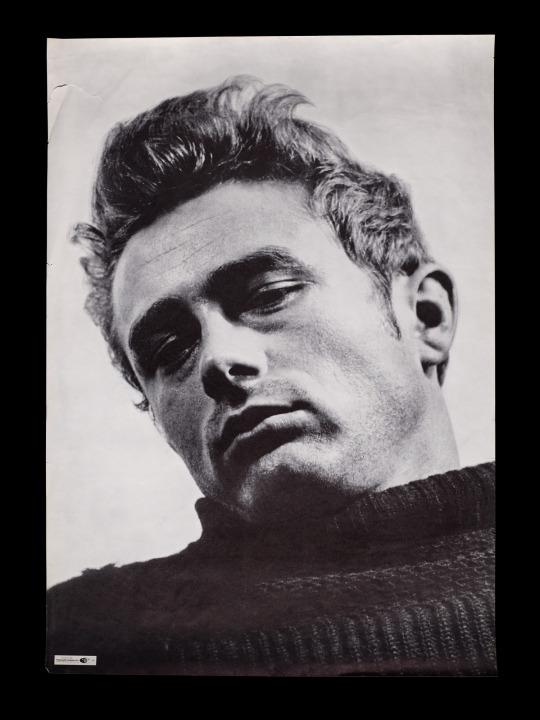
it was a pretty big part of who they were. but they *never* talked about why they chose him. i had my theories about him being the epitome of "live fast, die young" and his reputation as a star rebel, and that's probably it. maybe even the "famous living dead", considering the X's. but i hadnt considered james dean's unusual kind of masculinity.
richard dyer briefly talks about dean in comparison to rock hudson in his book "the culture of queers" (2002). comparing acting styles, dyer sees hudson as classic hollywood - straight, stiff, normal - while dean's naturalism "suggests someone ill at ease in the world, marginal and insecure." to dyer, hudson is stable heterosexuality, dean is insecurity associated with homosexuality. i connect this further to how it isn't just stability in sexuality, but in gender performance as well. dean's anxiety is so physical (intense eyebrows, hunched shoulders, flailing and wailing) that it's closely linked to how he's perceived, and how he's perceived as a man. he is insecure in his body, as if he's trying to escape it. he lacks masculine traits such as confidence, emotional stability .. even class (he directly represents this narratively in rebel without a cause). it wasnt the strong masculinity cinema, and dominant culture, favored. deyer also attributes dean's appearance (along with other actors' like monty clift and sal mineo) to othering him from the hudson-gable-cooper dominant masculinity: "physically slight, with intense eyes and pretty faces". many things contribute to the conclusion james dean disrupted dominant masculinity. im reading a book on this rn so im sure there's more to say (the book is gay fandom and crossover stardom by michael deangelis).
sooo i think that out of historical context, dean isnt as much disrupter. pretty much any idiot emo boy wants to act like james dean. he's cool now. but i like reading uneasy masculinity when i see that mychem poster. im not saying it was intentional, but dean's anxiety is the most important aspect of his acting to me. that necessarily translates to his expression, including gender expression. also i trust that film major and hitchcock-tattooed ray toro knows something about rebel without a cause
407 notes
·
View notes
Text
MAJOR FNAF MOVIE SPOILERS UNDER THE CUT. THIS IS YOUR WARNING
Alright. This is my theory on the whole “Afton Family” thing. I think Michael, Abby, and Garrett are all still Afton’s, however, they weren’t raised by William.
In the games, we know that Mrs. Afton isn’t relevant to the lore and is absent in the Afton family’s lives.
This is what lead me to think perhaps they were divorced, but William got custody over the children in the game lore. Meanwhile in the MOVIE, Mrs. Afton won custody.
This is what leads to the fork in the universes between the games and the movie.
Since in the movie, the Afton kids weren’t raised by William, Michael and Garrett never went to Fredbear’s Family Diner or inhaled hallucinogenic gas that made them develop fears of the animatronics. Because of this, there is no ‘bite of 83’ in this universe.
Instead, William, angry that his wife took the kids in the divorce, kidnapped Garrett and killed him (rather than Michael)
We see in the movie that “Steve Raglan” pauses when saying Mike’s name.
“Michael Sch….”
After this, he begins to act strange towards Mike. Why? Because that’s his ex wife’s name. That’s when William made the realization that the person in front of him was his son whom he lost custody of and later murdered his brother.
So now to address some questions about this theory:
“But what about the parents?”
The parents that we see in the flashback are likely Mike and Garret’s mom, as well as their step dad.
This would mean that Mike and Abby are likely step-siblings since Abby wasn’t alive pre-divorce (unless their mom was already carrying Abby from her previous relationship with William by the time Garrett disappeared.)
“What about Vanessa?”
Honestly? I’m not sure.
A: She has a different mom and was raised by Afton after the divorce
B: Afton got custody of her, meanwhile in the game timeline, Mrs. Afton/Schmidt got custody instead
C: She just wasn’t born in the game timeline until much later (23 years before Help Wanted.)
I really hope this makes sense bc Im just rambling rn😭I’m also sick and barely coherent so I might rewrite this later so it’s actually comprehensible
TLDR: The FNAF movie lore is similar to the game lore, however, in the game lore, William gets custody of the kids. In the movie lore, Mrs. Afton/Schmidt gets custody of the kids, preventing the Bite of 83, and leading William to kidnap and murder Garrett instead.
#FNAF#five nights at freddy's#fnaf movie#fnaf movie spoilers#fnaf theory#fnaf mike#mike fnaf#michael afton#vanessa fnaf#vanessa afton#abby fnaf#elizabeth afton#mike schmidt#fnaf garrett#garrett fnaf#crying child#fnaf crying child#fnaf movie theory
711 notes
·
View notes
Text
i don't really have any solid conclusions about this yet but i noticed A Thing in a rewatch and i haven't found it mentioned elsewhere yet so here we go
(apologies for the appalling image quality you're about to see, i can't screenshot easily rn pls bear with)
OKAY so in the scene where crowley confronts gabriel about "shut up and die", something about the arrangement of book stacks caught my eye a little
the majority of the books are angled so that we mostly just see the page edges and not the spines clearly, EXCEPT for a particularly shiny and familiar colour combo right here-
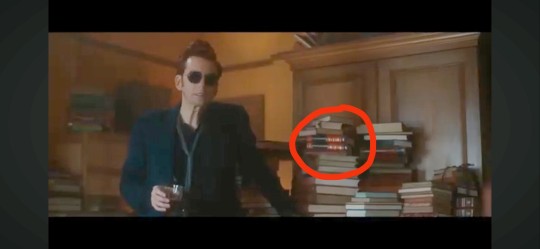
but nothing too weird going on there, i thought, crowley coloured books in a bookshop so what? right up until i registered crowley's line when we get a closer look-
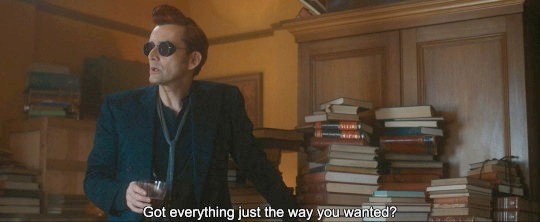
hhhhmmmmMMmmmm yes yes "everything just the way you wanted" huh, very interesting considering that we know how much thought goes into props huh
and for most of the shots we get of crowley in this position those freaking books are just quietly nestled right there in the corner-
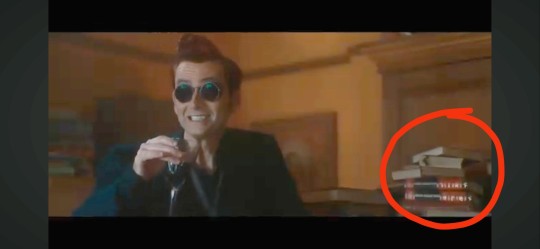
look at that god damn framing i fuckin see you, you glorious bastards
so i paused to see if i could figure out what the hell was up with those fuckers and this is when i absolutely lost my mind, your honour
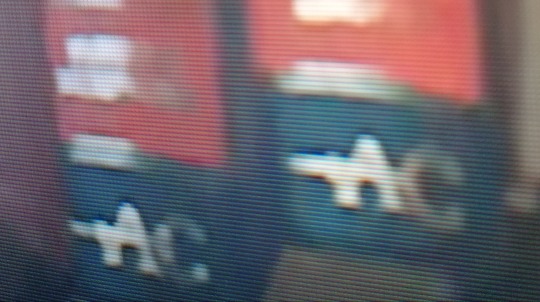
A and C you say?? in crowley colours???? framed like this?????? localised entirely within your kitchen???
anyway long story short they're two books from an Agatha Christie Crime Collection set (24 volumes, three stories per volume) and guess whats on the mfing front covers I'm-
(its a rant for another post but when paired with this other set of initials spotted in s2 i want to scream actually)
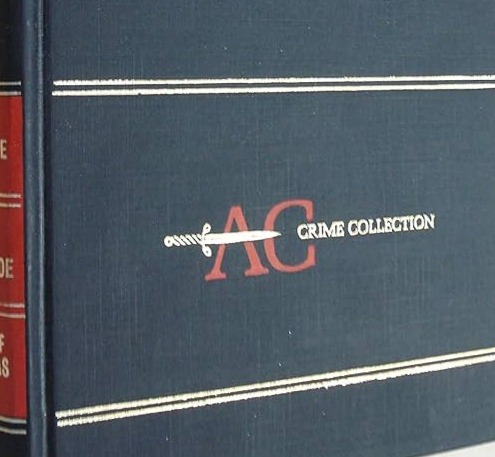
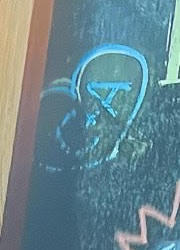
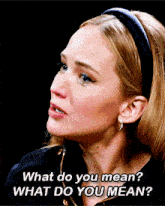
ANYWAY back to the books, through an absolutely unhinged comparison of the formatting of gold text blobs i reckon the two we have here are:
(on top) The Pale Horse; The Big Four, The Secret Adversary
(on bottom) 4:50 From Paddington, Lord Edgeware Dies, Murder in Mesopotamia
(I'm fairly confident but if anyone has a better image to confirm/correct this pls do)
now here is where I'll need a bunch of help from some Christie-heads out there bc I haven't read any of these and I've only seen the tv adaptation of one of them, so i dont know for sure if these are like A Clue, or A Cool Thing, or if I've just fully brainrotted myself into a fun lil corner here? wa-hoo
but here's some initial stuff that jumped out at me after skimming the basics:
(some of) the titles: Pale Horse/Big Four - death's horse ofc, the four horsemen mayb? the them+adam?? ; Mesopotamia is a very biblical choice bbz ; 4:50 From Paddington- azi likes trains i guess? idk that one's tenuous lmao ; honestly no idea with the other two but Secret Adversary feels a tad ominous
iirc Big Four just has kind of an unusual history, it was initially twelve short stories that she later compiled into one, and it was published fairly soon after christie's mysterious disappearance/reappearance
in Big Four, poirot fakes his death at one point and doesnt even let hastings in on it and I'm hoping sure its totally irrelevant to the ineffable bois
part of the Pale Horse story is a group of assassins that basically try to pass off all their murders as being actually caused by like ✨satanic powers✨ which is interesting
christie knew a fUCkton about poisonings thats why she wrote so many into her work and, while i don't believe the poison coffee theory myself, it sure is an interesting link with how cyanide is associated with almond smell/flavour and that metatron chooses almond syrup in particular
(ALSO random side note that is mostly meaningless but I've worked in a good few uk coffee shops and have never worked anywhere that stocks almond syrup; almond milk yes, hazelnut syrup yes, but never almond syrup...? prob just the places i worked though lmao)
EDIT forgotten point: I've seen some speculation that the bently's plate reading "CURTAIN" could be a reference to poirot's last story, along side that alternate scene of crowley ordering the sherry for "miss marple", its just one too many agatha christie references for my melted brain to handle and I'm SUS
so this is where i run out of idea steam and hand it over to you lot because i have no clue what this could mean, if it even means anything other than a cool set feature
is there something here actually or am i yelling into the void just for fun?
who knows, who cares!
#good omens#good omens 2#good omens spoilers#good omens 2 spoilers#good omens meta#ineffable husbands#ineffable idiots#agatha christie#hercule poirot#miss marple#can't wait to hear y'alls thoughts#SO WHY IS THERE A KNIFE THROUGH THE 'A' HUH#AND WHY IS THE 'C' ON THE CHALKBOARD SO FADED HMMM#GAIMAN EXPLAIN#things that make me go ngkk
242 notes
·
View notes
Text

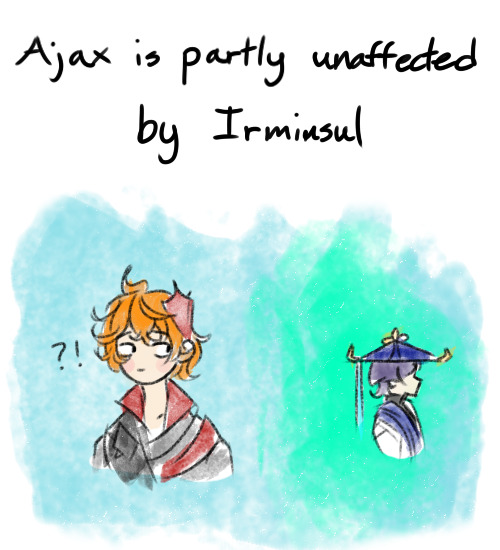
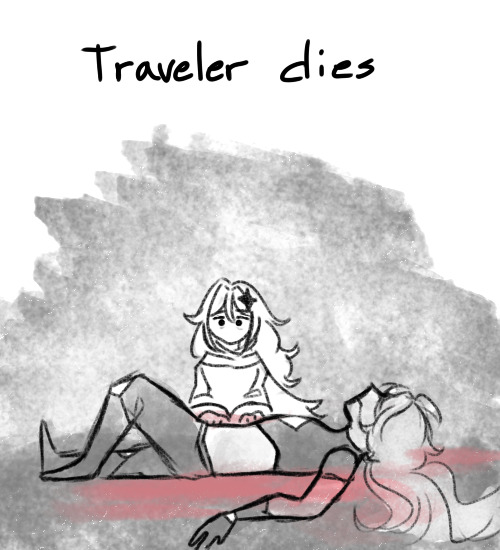
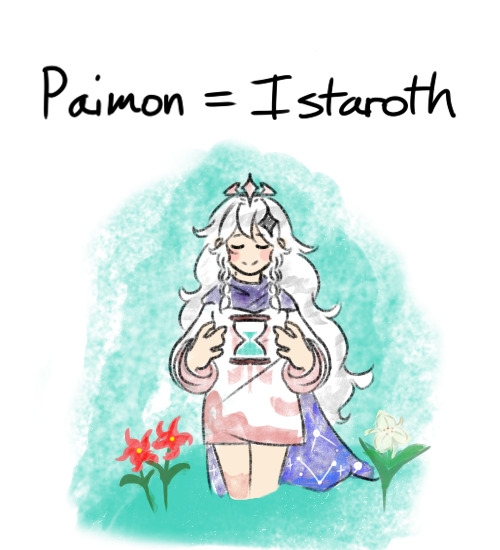
in a genshin lore mood rn so I drew some of my favorite theories/predictions
explanations:
Teyvat is Upside-Down: From what I know, it's basically the idea that the stars are fake because the Abyss is above Teyvat, not the real sky. I've also seen someone say that Celestia is Hell because it's down below if this theory is true, but I'm not sure how many people think that.
Ajax is Partly Unaffected by Irminsul: Due to spending time in the Abyss (outside Teyvat) and being completely changed by it, Childe is probably at least a bit resistant to having his mind altered by the Ley Lines, which affect everyone else in the world entirely. Of course, we see that it did affect him after the 3.3 quest, but Irminsul is likely gonna pop up as a plot point again, so who knows. I'm not sure how widespread this one is because I've only seen it in Chiscara fics/art and one (1) discord thread, but I like it so ehhh
Traveler Dies: Less of a theory and more of an angsty "what if?" scenario. It's silly, obviously the MC themself isn't gonna die. HOWEVER their sibling might.......or they both live in the end, but Traveler gets another major injury or presumed death scene. I personally think that the twin will die fighting either us or Celestia if hyv decides to make them not playable.
Paimon = Istaroth: That one huge theory about Paimon being the Unknown God but its a different lady now. Istaroth is the god of wind and time, and is possibly one of the Primordial One's shades. She used to be worshiped in Mondstadt and Enkanomiya before being eventually forgotten. People made the connection between her and Paimon because:
1. We control time with the Paimon menu,
2. Traveler fished up Paimon near the nameless island, which is Istaroth's temple,
3. In the 3.4 Lantern Rite epilogue, Venti (who's connected to Istaroth) barged in saying "Seeds of story, brought by the wind…", and Paimon finished his sentence, "…and cultivated by time". Venti's part is the name of achievement we got from going to the sundial island, and there's the wind and time theme again. Paimon herself was surprised that she said that without thinking, so it's safe to assume that it was a subconscious response that's been ingrained in her head for a while.
#genshin impact#genshin lore#this is like 50% based off discussions from discord/youtube#and 50% self indulgent copium thoughts#tartaglia#childe#scaramouche#venti#paimon#aether#my art#duckydraws#babys first time using the watercolor brush btw
182 notes
·
View notes